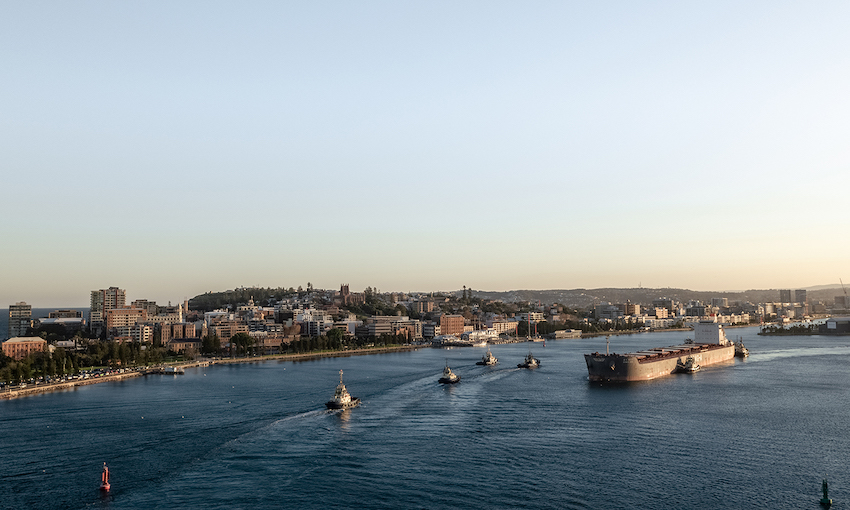A BILL tabled in New South Wales Parliament on Thursday has formalised a vision for Port of Newcastle to operate as a container port.
The Port of Newcastle (Extinguishment of Liability) Bill 2022 was introduced by Greg Piper, independent MP for Lake Macquarie on 13 October.
The stated goal of the bill is to “extinguish certain liabilities of the operator of the Port of Newcastle relating to an agreement between the state and the operator of Port Botany and Port Kembla”.
In effect, it intends to undo a deal made in 2013 which capped the number of containers Port of Newcastle could handle before having to pay a fee on every unit exceeding the limit, which would be collected by the state government and paid to NSW Ports as compensation.
In a speech to parliament, Mr Piper said the bill aimed to fix what he described as “a very bad deal brokered by a former government to the great detriment of the state’s economic potential”.
“It was a deal that has become a deadweight on the state’s future, and it was a deal that put the Hunter’s potential into a straitjacket in order to deliver a short-term windfall,” he said.
“It is my very firm view – and certainly the view of most in Newcastle and beyond – that that clause [limiting container throughput] constitutes a considerable restriction on free trade, is anti-competitive and creates a monopoly for NSW Ports to the detriment of the Hunter and other regional areas north of Sydney.”
Mr Piper made reference to the Productivity Commission’s draft report into Australia’s maritime logistics system, published last month, which found inefficiencies at container ports were costing the country an estimated $605 million each year.
Indeed, the report suggested port privatisation processes had entrenched market power in Sydney “by combining the ownership of Port Botany and Port Kembla and penalising any development of container capacity at the Port of Newcastle”.
Mr Piper noted Port of Newcastle’s proposition of a new container terminal which would, apparently, accommodate ships too big to dock at existing container ports.
“However, investors are unwilling to commit because of uncertainty over the existing deed and the penalty clauses, which could make building the terminal uneconomic,” he said.
Mr Piper also described the challenges faced by farmers, producers and manufacturers who are reportedly negotiating costly bottlenecks and logistical challenges to export products because they are unable to ship through Newcastle without bearing extra costs imposed on the port.
“Let those people tell you about the extraordinary cost of sea freight, which has skyrocketed sixfold since the start of the pandemic,” he said.
“We must unshackle the port of Newcastle from a lazy deal that is good for no-one except the shareholders in New South Wales ports and their monopoly at Botany and Kembla.
“It was a bad deal and it would be far cheaper to get out of it now than face the restraints, losses and limitations that will cost us billions over that next 43 years.
“I believe there are very few members of this House who would not agree that the deals done back in 2013 and 2014 were genuinely deficient and anti-competitive.”
The ports respond
Port of Newcastle CEO Craig Carmody applauded Mr Piper for his leadership in “dealing head on with the serious barriers” facing the NSW economy and business in import and export trades.
“Port inefficiency, as outlined by the Productivity Commission’s maritime logistics system draft report, is a $605-million problem for Australia and $316 million, half of that, is attributed to Port Botany,” he told DCN.
He said the bill would allow Port of Newcastle to invest $2.4 billon in building a second container port in NSW.
“This will allow competition into the market to the benefit of our exporters and importers struggling with high costs, supply chain bottlenecks and a lack of options,” he said.
“I encourage all members of parliament to look beyond the interest of a monopoly and to understand how supply chain congestion and dysfunction is severely impacting the state.
“Voting in favour of this bill reaches far beyond the Port of Newcastle; it opens up industry across many sectors, drives employment and increases competition, which drives down the costs for producers and consumers.”
But NSW Ports rejected Mr Piper’s claims and challenged the points tabled in parliament.
Speaking with DCN, a spokeswoman for NSW Ports made clear from the outset that NSW Ports was not a party to the commercial agreement entered into by the Port of Newcastle with the state when the port at Newcastle was privatised in 2014.
“However, we note that many of the claims being made are not credible and ignore the realities of NSW’s container supply chains, including the fact that such trade is primarily import focussed and destined for the large population centres of Greater Sydney,” she said.
“This means that a container terminal at Port of Newcastle would add more than 5000 truck movements a day to the M1 and worsen congestion and greenhouse gas emissions, as containers would need to be trucked 200 kilometres to Sydney.”
She suggested “billions of taxpayer dollars” would also need to be spent on connecting infrastructure between Newcastle and Sydney.
“Nor would a Newcastle container terminal generate more trade volume. The net outcome is higher costs for users across the existing trade base.
“Separately, we note that Australia’s ports and port supply chains have been more resilient than those around the world, despite the impact of global shipping delays.
“Containers at Port Botany are being cleared within three to four days, while trucks can arrive, collect a container and depart within about 30 minutes, which is substantially faster than for many ports overseas.”

